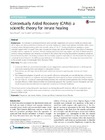Contextually Aided Recovery (CARe): a scientific theory for innate healing

Abstract
Background
The chiropractic profession emerged when scientific explanations for causes of health and disease were still in infancy and the co-existence of notions such as innate healing and vitalism were perhaps admissible within such a historical context. Notwithstanding, within the scientific culture of the 21st Century all healthcare paradigms require evidential support which in regard these early concepts are in large part, absent. Nevertheless, a large body of emerging scientific evidence supports the existence of innate healing phenomena that may explain a plethora of clinical outcomes observed during chiropractic care. However, in contrast to the notion that removing the putative subluxation constitutes the mechanism by which this healing is initiated, the evidentially supported explanation is one that invokes the impact of contextual factors inherent in the skilful care and authority of the healthcare provider. This perspective is presented here as the scientific model of Contextually Aided Recovery (CARe).
Main body
This paper contends that;
1. Contextual effects are powerful and desirable and are triggered by contextual factors present in all therapeutic encounters including those encountered in chiropractic practice.
2. These factors can elicit large clinical effects with substantive evidence supporting pain, immune and motor modulation.
3. The compartmentalisation of specific and non-specific effects is a biologically and scientifically false dichotomy, erroneously invoked to de-legitimise treatment approaches that expertly construct contextual healing scenarios.
4. The use of factors to construct contextual healing scenarios that maximise positive (placebo) and minimize negative (nocebo) effects is a skilful clinical art within the multimodal approach that describes modern chiropractic care and should be presented and defended as a legitimate component of orthodox healthcare
Clinical improvement during chiropractic care, beyond any biologically specific treatment effects of manipulation and other modalities, may be largely understood considering contextual factors as described by a Contextually Aided Recovery (CARe) model.
Collections
Date
2017Author
Newell, Dave
Lothe, Lise R
Raven, Timothy J L